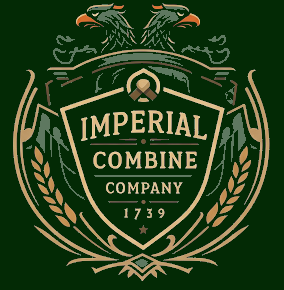Imperial Combine Company
The Imperial Combine Company is the largest manufacturer in the Levatine agricultural machinery industry. The company traces its heritage to a small farming community called Costalunga, in the Grand Duchy of Verecundia, in modern-day Lapody, in 1739.
 | |
| Company type | Public |
|---|---|
| ICC | |
| Industry | |
| Founded | 1739 |
| Headquarters | , |
Area served | Levantia |
| Products | |
Number of employees | 75,800 (2035) |
History
In the midst of the High Dericanian Plains' fertile steppe climate, the potential for agriculture was often impeded by the hard topsoil due to the centuries-old network of grassroots. A man named Benedetto Doria, a yeoman with a modest estate, and his son-in-law Gialdo Montaldo, a wealthy blacksmith, invented what would become known as the Montaldo plow. It's lightweight design, using fewer animals for draft power, made plowing more efficient and affordable for farmers while also improving soil health. It became the first mass-produced plow when, in 1793, a factory was built to create the plows by Giovanni Montaldo (Gialdo's son) who was not able to make the plows in sufficient numbers in his smithy. With the increased yields from being able to break more ground more quickly and with fewer draft animals, the division of labor was shifted in the Verecundian farms from the animals to humans who were required to thresh the increased grain yields. After the Second Caroline War, there was a massive manpower shortage in Verecundia, so in 1801, Giovanni invented an animal-powered thresher which reduced the number of laborers needed to thresh the wheat. As the Industrial Revolution took off, the Montaldo's kept pace and also set the standard for agricultural innovation. This was not always met with appreciation by the lay farmers, but in cultures where farms were larger, like in Maritime Dericania, who still primarily farmed in latifundia, the Montaldo's machines were seen as heaven-sent. In the late 19th and early 20th century, the company gained significant recognition for its innovative traction engine tractors and belt-driven farm equipment, which increased productivity and further reduced the requirement for human labor. Since slavery had been formally banned in 1875 in the newly formed Burgundie, these machines were vital to keeping the latifundium producing for a rapidly expanding populace. During the Great Depression, in 1910, the Montaldo's assets were bought by a Fiannrian concern (KUHL TRACTOR CO HERE) and they formed the Culfra-Deracanian Traction Engine Company. The factories in Verecundia ran for another 7 years before they were closed and the company solely operated out of Fiannria, despite keeping the name. Having the factories so far from Burgundie increased delivery costs, and the advent of the Third Fratricide make it impossible for the agricultural machines to be brought to Burgundie, so a licensing agreement was made and factories within Burgundie were allowed to produce Culfra-Deracanian Traction Engine Company machines. After the end of the Second Great War, Burgoignesc interests bought a majority stake in the company and had the headquarters moved to Burgundie, buying out the factories that had built the Culfra-Deracanian Traction Engine Company machines under license, to make them official company factories. The name was changed to the Trans-Levantine Combine Company. During the 1960s, with a massive deployment of rural men to Operation Kipling from both Burgundie and Urcea, there was a massive surge in the need for farm equipment to meet the demands of feeding the populace, those deployed overseas, and to provide humanitarian aid in Audonia. Trans-Levantine Combine Company merged with an Urcean manufacturer (URCEAN TRACTOR CO HERE) and the modern Imperial Combine Company was formed on May 19th, 1968. By 1984, Imperial had solidified its position as the largest agricultural equipment manufacturer and dealer in Levantia, a title it was retained, almost without interruption, ever since.
21st Century Imperial Combine
In the 2010s Imperial Combine Company started to integrate digital tools and precision technologies to optimize agricultural operations into their machine offerings. IC-FieldSense, a network of sensors, collects real-time data on soil conditions, moisture levels, and crop health. This data is transmitted wirelessly to the farmer's IC-FarmControl platform. IC-FarmControl acts as a central hub for managing farm operations. Farmers can access real-time data from IC-FieldSense, historical records, weather forecasts, and market trends. The platform also facilitates remote control of machinery and automated tasks. IC-AutoGuide is an autonomous navigation system that enables tractors and other machinery to operate with high precision. This reduces overlaps and minimizes input waste. IC-VariableRate technology allows for precise application of fertilizers and pesticides based on real-time data and crop needs. This minimizes environmental impact and maximizes resource utilization. IC-DroneScout uses advanced drone technology, provides aerial imagery and multispectral analysis of fields. This allows farmers to identify problem areas, monitor crop health, and assess yields. Imperial's precision agriculture technologies are designed to reduce water consumption, minimize fertilizer and pesticide use, and improve soil health. IC-FieldSense and IC-VariableRate optimize irrigation. Precise input targeting reduces waste and minimizes environmental impact. IC-FieldSense provides data on soil conditions, enabling farmers to implement practices that promote soil fertility.